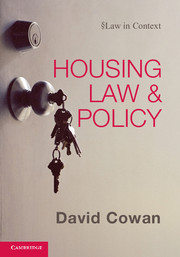Book contents
- Frontmatter
- Contents
- Preface
- List of abbreviations
- Table of legislation
- Table of international instruments
- Table of cases
- 1 Locating housing law and policy
- Part I Regulation of housing tenure
- Part II Access to housing
- Part III Rights and responsibilities
- 11 Security of tenure
- 12 Harassment and unlawful eviction
- 13 Property state and condition
- 14 Arrears
- 15 Anti-social behaviour
- 16 Mandatory possession proceedings
- Postscript
- Bibliography
- Index
12 - Harassment and unlawful eviction
from Part III - Rights and responsibilities
Published online by Cambridge University Press: 05 June 2012
- Frontmatter
- Contents
- Preface
- List of abbreviations
- Table of legislation
- Table of international instruments
- Table of cases
- 1 Locating housing law and policy
- Part I Regulation of housing tenure
- Part II Access to housing
- Part III Rights and responsibilities
- 11 Security of tenure
- 12 Harassment and unlawful eviction
- 13 Property state and condition
- 14 Arrears
- 15 Anti-social behaviour
- 16 Mandatory possession proceedings
- Postscript
- Bibliography
- Index
Summary
Harassment and unlawful eviction of tenants is both a crime and civil cause of action. It is not possible to tell the extent of the issue with any accuracy, as there are no published statistics of such management problems. We do know that in 2008, there were twenty-seven prosecutions brought under the relevant Act (the Protection from Eviction Act 1977), of which fourteen defendants were found guilty (Home Office 2010: table S5.1). We know that 11 per cent of tenants in the PRS were either slightly or very ‘dissatisfied’ with their landlords (a slightly higher proportion of tenants on HB), but, as Rugg and Rhodes (2008: 60) correctly identify, satisfaction surveys tell us little if anything. It is likely that, given the limited security of tenure in much of the PRS, most of the management problems between landlord and tenant that are, or approach being, harassment and/or unlawful eviction go unreported (Kemp 2004: 168; see Rauta and Pickering 1992; Jew 1994, who estimated that there may have been 144,180 households who had been, or were being, harassed by their landlords). Tenants may not appreciate the proper processes which landlords are required to go through before obtaining possession of the property – indeed, qualitative research with tenants suggests that ‘many believed that they remained in their properties as a result of the good faith of their landlords and not as a result of legal frameworks of security of tenure’ (Cowan 2001: 254).
What we have to go on, then, is largely anecdotal and individual case history-based (see, for example, Carlton et al. 2003; Rugg 2008: 15). A particularly fine anecdotal example of alleged harassment can be found described at http://nearlylegal.co.uk/blog/2010/08/on-the-naughty-step-drop-the-dead-donkey-redux/, concerning the actions of a landlord who, having served what appears to have been an invalid notice seeking possession, then arrived at the property with the GMTV cameras, describing the occupier as a ‘squatter’, with the GMTV ‘anchor’, Sally Smedley, asking: ‘why can’t the landlord turn up with the police, or turn the electricity off, as so many viewers have emailed to say they should do this?’
- Type
- Chapter
- Information
- Housing Law and Policy , pp. 296 - 311Publisher: Cambridge University PressPrint publication year: 2011



